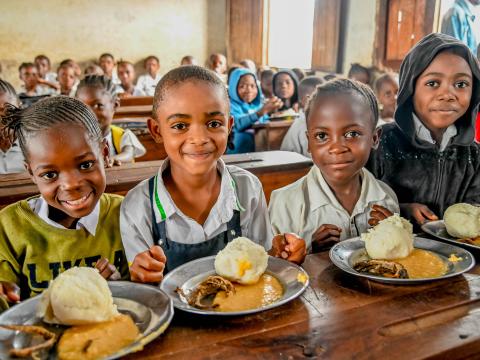DR Congo: More Than 3,000 Pupils Benefit from School Meals to Improve Their School Performance

By Tatiana Ballay - Communications Officer
A major milestone has just been reached for the children of Kalemie, in Tanganyika province, with the official launch of the Supplementary Meals Programme at Kichanga primary school. Initiated by World Vision DRC and funded by World Vision Singapore, this pilot project aims to combat hunger and malnutrition in 10 primary schools in the town, while improving the children's nutritional status and academic performance. These supplementary meals will reinforce the rations the World Food Programme provides, which already include cereals and pulses.
A structured and nutritional programme
The programme, implemented with the support of the World Food Programme and local partner APETAMACO (Association des Éleveurs Maroquiniers du Congo), offers a nutritional supplement consisting of proteins (smoked fish), salt and oil. Distributed twice a week, every Tuesday and Thursday, these meals provide 900 to 1,100 extra kilocalories per plate, significantly contributing to the children's daily energy requirements.
At the launch, 1,050 pupils from Kichanga primary school and 7 teachers benefited from this additional meal. Musimbwa primary school, with its 529 children including 7 teachers, is also a beneficiary of this programme. Eventually, the initiative will cover 10 primary schools and involve almost 3,000 children.
Enthusiastic and grateful children
The enthusiasm of the children was palpable. Many shared their delight at receiving smoked fish, a valuable source of protein rarely found in their daily meals.
‘I'm happy to have fish at school today. It's a change from what we usually eat,’ says Patrick, a primary 6ᵉ pupil.
School meals are often the only stable source of nutrition for many children. With an energy intake of between 900 and 1,100 kilocalories, children benefit from more complete and balanced meals.
‘By offering these meals, we are not only meeting children's immediate nutritional needs, but also enabling them to attend school under better conditions’, explains Jared Mombo, Food & Cash Assistance Manager at World Vision DRC.
An initiative that responds to the call for the extension of school canteens
The launch of school meals in Tanganyika province is directly in line with World Vision's ‘ENOUGH’ campaign, a global initiative aimed at putting an end to hunger and malnutrition. In the DRC, where more than 25 million people suffer from food insecurity, children are the first victims. The school meals programme, which provides balanced nutritional rations, combats child malnutrition and encourages children to stay in school.
The ‘ASSEZ’ campaign also advocates the extension of school canteens to all primary schools in the country. In Tanganyika, acute food insecurity affects more than 1.8 million people, making it essential to introduce balanced meals in schools to make up for this nutritional deficit. As well as meeting children's immediate needs, these school canteens help to improve their performance at school and reduce absenteeism.
The pilot project set up in Kalemie, which includes the participation of parents and local communities, illustrates this innovative and collaborative approach. It also shows how the ‘ENOUGH’ campaign can be a powerful lever for advocating the expansion of these programmes on a national scale. By increasing the impact of school meals, World Vision and its partners, in particular the World Food Programme, aim to create a sustainable solution to malnutrition and hunger in schools. This pilot project will be implemented over 8 months. Although this programme represents a major step forward, it is only a first stage. A period of observation and evaluation will enable the interventions to be adjusted to maximise their impact.